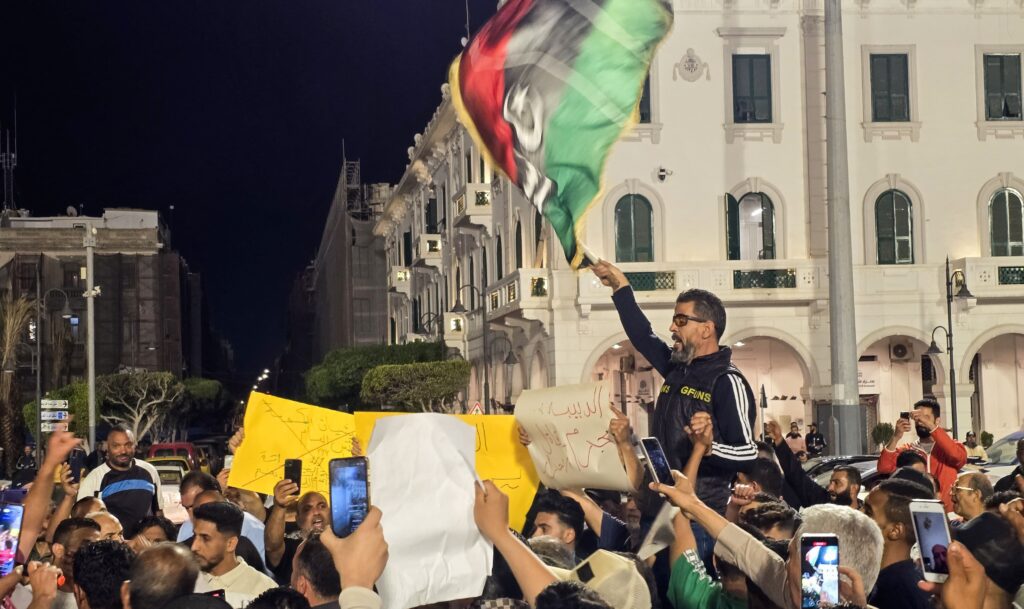In the Libyan capital Tripoli, change is rarely peaceful or linear. This was starkly demonstrated once again in mid-May, when what like seemed a strategic victory for Prime Minister Abdul Hamid Dbeibah quickly spiraled into the latest in the country’s long string of political and military crises.
The episode began when Abdelghani al-Kikli, the head of the Stability Support Apparatus—an armed faction linked to Libya’s Presidential Council—was killed in a confrontation at the capital’s Tekbali military base. His killing, on May 13, reportedly came after a meeting with senior security officials from Dbeibah’s Government of National Unity (GNU). Despite the grim optics of a state-aligned commander dying in a shootout with other government-linked actors, the Dbeibah administration swiftly embraced the moment, presenting it as a bold move against the militias that have dominated and splintered Libya since the toppling of Moammar Gadhafi by a NATO-backed uprising in 2011.
Al-Kikli, better known as Ghaniwa, had long operated in a grey zone between formal authority and informal power, empowered for years by the very executive that now disowned him. His killing appeared driven more by factional rivalries than genuine strategy, but the GNU portrayed it as a turning point in restoring state control over security—at least in the western part of Libya that it nominally controls.
Its subsequent actions quickly undercut that narrative, however. Instead of stabilizing the capital, the GNU escalated its campaign, moving against other influential armed groups, including the Presidential Council-affiliated and Salafist-leaning Special Deterrence Force (SDF) and its affiliates. Dbeibah simultaneously issued executive decrees consolidating his loyalists’ control over key institutions, moves that fueled perceptions that factions from outside Tripoli were being excluded and catalyzed the SDF’s military mobilization. In response, the group activated its support base across the densely populated residential district of Souq al-Jumaa and sought military support from other factions marginalized by the prime minister’s growing concentration of power, including those of Zawiyah and Tajoura in Tripoli’s hinterland, and towns home to Libya’s Amazigh ethnic minority.
What had been an operation to remove a single commander thus devolved into a multi-front conflict, drawing in other militias and prompting drone strikes and street-level clashes. With no coherent strategy guiding the state’s actions, Tripoli descended into its worst violence in years.
By the time commanders of the armed groups and communal leaders had brokered a ceasefire on May 14, the narrative had shifted. The government’s failure to secure the capital or protect civilians reinforced perceptions that this was a redistribution of influence, not a dismantling of militia power. The operation appeared aimed simply at replacing one layer of patronage with another. Proclamations of reform rang hollow, and the notion of the state reasserting its authority faded from view.
By Friday, the streets responded. Protesters rallied at Martyrs’ Square in central Tripoli, voicing frustration over corruption and calling for the GNU’s dismissal. But even these demonstrations had two faces: that of the genuine civic voice of communities aggrieved by violence and disillusioned by years of failed governance; and that of political and armed factions seeking to instrumentalize the discontent and embedding themselves in the protests to destabilize Dbeibah’s rule. This blurred the line between legitimate mobilization and factional manipulation. While both the GNU and its detractors have tried to paint the protests in black and white, the true story is unfolding in shades of grey.
Can the GNU Last?
It was in this atmosphere that a few senior state officials resigned, citing support for the demonstrators. Again, these were not isolated acts of conscience, but part of a coordinated campaign by factions, once tied to the GNU, who are now seeking to dismantle it from within. By orchestrating the resignation of officials they had previously backed, they are accelerating the unraveling of Dbeibah’s cabinet.
On Saturday, Dbeibah sought to reclaim the narrative and limit the political fallout. He met communal leaders from across the Tripoli region and Misrata and delivered an address defending the objectives of his military campaign. While parts of the public may be receptive, many GNU-aligned armed groups are unlikely to escalate further on his behalf. Most factions are well aware that doing so could redirect public anger toward them. For most, safeguarding their territorial foothold and influence takes precedence. The premier’s support base is therefore shrinking—not through overt defections, but through the erosion of support from erstwhile actors unwilling to stake their own positions on his survival.
On Sunday, roadblocks reappeared in the capital, and banks headquartered in eastern Libya, dominated by a separate authority, suspended dealings with Tripoli-based institutions. These actions were far from neutral—they reflected deliberate, politically motivated attempts to sow disruption. By targeting both daily life and economic stability, Dbeibah’s opponents sought to exploit the unrest and deepen the perception of his government’s failure. What began as civic protest has been transparently weaponized, providing Dbeibah an unlikely lifeline.
The prime minister may yet survive—not thanks to his own political skill, but because of his rivals’ vacuous maneuvering. A case in point was a move by the eastern-based House of Representatives (HoR)’s Speaker Aguila Saleh, who sought to capitalize on the moment to push for yet another replacement of the executive. But this move has little to do with solidarity with the Libyan people, and the public is unlikely to be deceived. Contempt for the HoR rivals—if not exceeds—that directed at the GNU. Saleh’s impulse to exploit the moment could even end up salvaging the very government he seeks to replace.
Repeating the Past?
Worryingly, the current moment bears the hallmarks of one of the most dangerous episodes of Libya’s past—one that served as a harbinger of broader conflict . In late 2018, violence between armed groups in western Libya fractured Tripoli’s security landscape, paving the way for eastern-based military chief Khalifa Haftar’s ill-fated offensive on the capital in April 2019. Today, the same fault lines are reappearing, the same opportunism is on display, and the same illusion—that power can be seized with impunity—continues to guide those vying for control.
This perilous moment not only demands dialogue, it necessitates a decisive break from the formula that has failed Libya for over a decade. Diminishing public trust in the GNU has created a rare opening to dismantle the political scaffolding that has entrenched Libya’s dysfunction. Any process that returns to elite bargaining between the eastern-based HoR and the High State Council (HSC)—another of Libya’s power centers—to simply reshuffle the Tripoli government is not only futile, it is insulting to a public that has paid the price of their inertia.
Libya needs the removal of both its rival governments, and an end to the long-extended mandate of a parliament that has come to symbolize stagnation and failure. A streamlined interim authority, with economic and security sector reform at its core, should anchor any future transition. If international actors continue to treat the HoR and HSC as legitimate interlocutors, they will only reproduce the crisis they seek to resolve. Rhetorical support for the United Nations’ mediation efforts in Libya is not enough. Libya’s partners must both challenge and empower the UN to break with failed frameworks and articulate a credible roadmap that reflects the urgency—and opportunity—of the present moment.
Absent this kind of reset, Libya is likely to repeat its most dangerous patterns. The alternative to change is not stasis, it is escalation.


